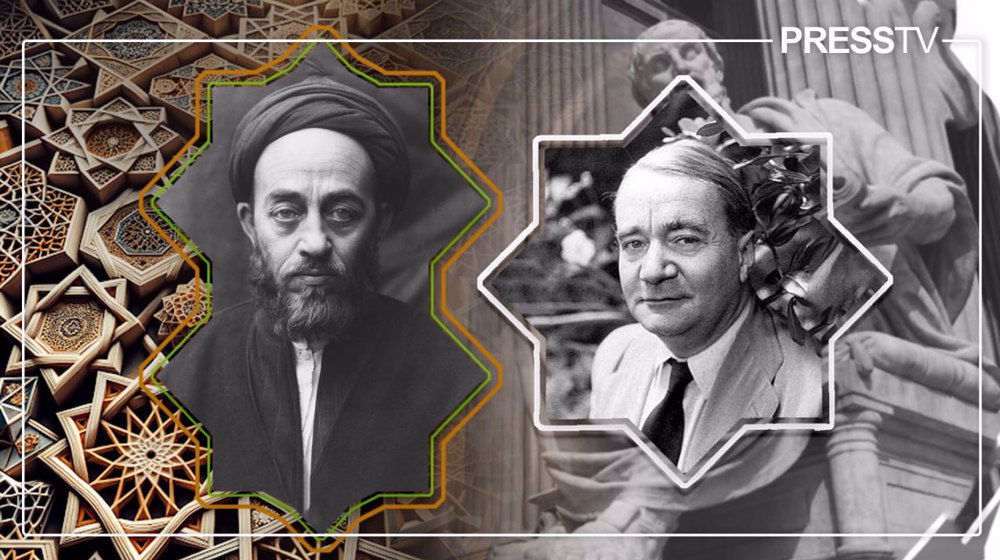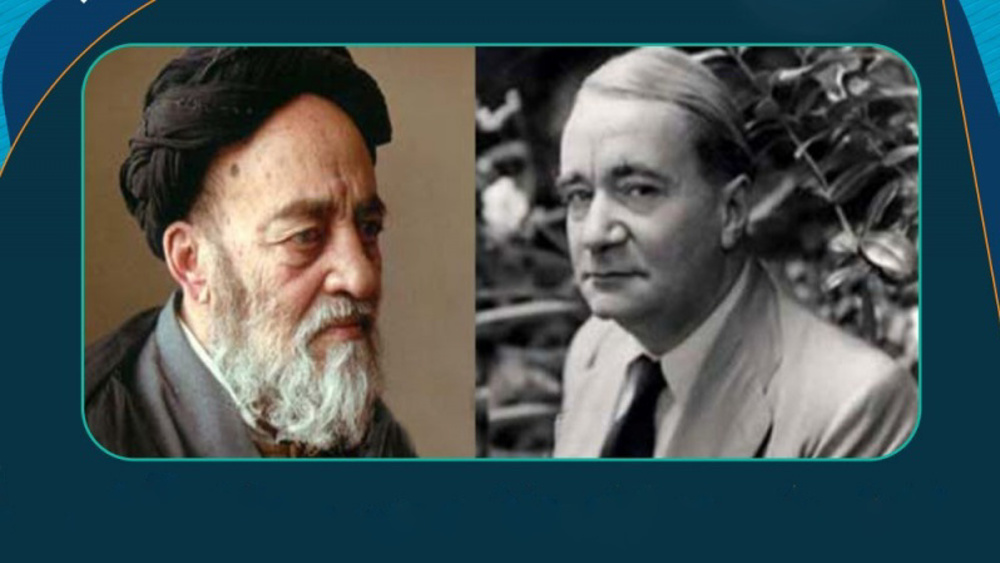Search The Legacy of Henry Corbin: Over 800 Posts
Sunday, November 17, 2024
Corbin and Tabataba’i
How Iranian luminary Allameh Tabataba'i inspired French Orientalist Henry Corbin

By Humaira Ahad
Allameh Mohammad Hossein Tabataba'i is widely regarded as one of the modern era's most celebrated and revered Islamic mystics and philosophers, a luminary whose intellectual brilliance has inspired generations.
Many regard him as one of the greatest Muslim figures to emerge from Iran in the last century, a true embodiment of wisdom and spiritual depth.
Allameh Tabataba'i was born in 1903 in Tabriz, a city in western Iran, into a family of sayyids — descendants of the Holy Prophet (PBUH). The family had already produced over 14 generations of notable theologians and thinkers.
Allameh Tabataba'i authored more than 40 books, all masterpieces of intellectual thought. However, his crowning achievement is “Tafsir al-Mizan”, a twenty-volume commentary of the Holy Quran written in Arabic. The commentary has been described by many as a divinely inspired work.
“Allameh Tabataba'i was one of the exceptional wonders of our seminaries in the last century. A combination of qualities such as knowledge, piety, morality, literary talent and artistry, and sincerity and friendship was what formed the personality of this great man,” Leader of the Islamic Revolution Ayatollah Sayyed Ali Khamenei said at the International Congress in Honor of Allameh Tabataba'i in 2023.
Ayatollah Khamenei highlighted the wide scope of Allameh Tabataba'i's profound knowledge and spiritual wisdom, which put him in a different league.
“He was an expert in the principles of jurisprudence. He was a philosopher. And he had a deep understanding of theoretical mysticism. He was a scholar in astronomy and mathematics. He was an outstanding scholar in the interpretation of the Quran and the Quranic sciences. He was a skilled poet. He was also skilled and active in the science of genealogy.”
The celebrated Iranian polymath’s work was unavailable to Western readers till French metaphysical philosopher and Iranologist Henry Corbin introduced Allameh Tabataba'i to Western audiences through his work on Shia spiritual teachings.
Allameh Tabataba'i’s meetings with Henry Corbin
Corbin, a luminary in his own right, was deeply influenced by Allameh Tabataba'i’s works and made no secret of it. He even met Allameh to discuss the spiritual aspects of Islam and Shiism.
“Allameh Mohammad Hossein Tabataba'i, the great professor of traditional philosophy of theology and mysticism from Qom, was the central figure of our meetings,” writes Corbin in his magnum opus “En Islam Iranien” (Islam in Iran), published in 1971.
Tabataba'i led a bi-weekly study circle in Tehran, in which Corbin, who was then a professor of Islam and Islamic Philosophy at the Sorbonne University in Paris and also at the University of Tehran, participated alongside a group of Iranian intellectuals.
Other notable figures who participated in these meetings included Ayatollah Murtaza Motahhari, Ayatollah Makarem Shirazi, Sayed Hadi Khosrowshahi, and Sayed Hussain Nasr, among others.
Those in attendance recall Corbin sitting next to Allameh Tabataba'i in complete humility and respect.
“He was like a polite student, asking his questions to Allameh Tabataba'i,” Sayed Hadi Khusrowshahi, an Islamic scholar and former Iranian ambassador to the Vatican, wrote in his book on Allameh Tabatabai.
Corbin would be in Iran every autumn, eager to meet Allameh Tabataba'i. The meetings mainly revolved around philosophical, theological, and mystical issues.
In the initial meetings, they discussed the ideological foundations and teachings of Shiism. The conversations were later published in Allameh Tabataba'i's book, “A Shi’ite Anthology.”
“Allameh was a great man. In the field of philosophy and Qur'anic interpretation, he was a leading authority. His expertise could be found in the discussions between him and Corbin," Dr. Nasr, professor of Islamic studies at George Washington University, writes about these meetings.
"In September, Corbin would come to Iran. He would discuss the current philosophical and theological issues of that time. The issues were raised in the form of questions to Allameh Tabataba'i, and he provided answers.”
Dr. Gholam Hossein Ebrahim Dinani, professor emeritus at Tehran University and one of Allameh Tabataba'i’s students who would accompany him from Qom to Tehran, says these meetings provided a platform to Corbin for the exchange of opinions about the spiritual possibilities of man.
“The decision to meet Allameh Tabataba'i was Corbin’s personal choice. He believed that the materialistic philosophies of the Western religion and the harsh Western tendencies have made life difficult for man and separated him from his spiritual roots," Dr Karim Mojtahedi, an Iranian philosopher was quoted as saying in an interview.
"Corbin was exploring a way into the East. His search finished after meeting Allameh Tabataba'i, as the Iranian cleric represented an original spiritual figure."
Corbin’s association with Allameh Tabataba'i reinforced his belief that “Islamic Iran has been the country par excellence of the greatest philosophers and mystics of Islam.”
“The French scholar’s meetings with Allameh Tabataba'i showed that not only did Iranian Islamic philosophies not end after Ibn Rushd, but spiritually and mystically Islam has an extraordinary flourishing culture and Iran is a clear example of it,” Mojtahedi added.
Allameh Tabataba'i and his position, according to Corbin, were inseparable from the entire tradition of Iranian spiritual culture. Corbin regarded him as a living example of the spirituality of the East.
For Corbin, the spirituality propagated by Allameh Tabataba'i was the essence of the soul of man, and regardless of the East and the West, it held the power to bring real spiritual joy.
Through his conversations with Corbin, Dr. Mojtahedi found that the Western philosopher was in search of man’s destiny. He was looking for a philosophy that would help man gradually become more and more familiar with the possibilities of his perfection, ensuring the development of his spirituality.
Corbin’s quest ended after his encounter with the great Iranian scholar and philosopher.
Following his meetings with Allameh Tabataba'i, the French professor’s writings provided an opportunity for the West to delve into the "Iranian-Islamic" intellectual traditions.
According to Corbin’s “Islam in the Land of Iran, Philosophical and Mystical Perspectives", the spread of Shiism based on the wisdom of the prophets, generation after generation caused the emergence of very original and brilliant thinkers who were experts in various fields.

Islam and Iran – Allameh Tabataba'i’s Influence on Corbin
After a lifetime of research and exploration of the philosophy and mysticism of Shia Islam, Corbin believed that “the Persian world was clothed in symbolic meaning.”
“Persia was the country of Zoroaster, Sohravardi, Ruzbehan, and Ḥafeẓ, a world both intermediate and mediating . . . not merely a nation or even an empire, but an entire spiritual universe, an arena for the history of religions,” he wrote.
Dr. Dinani says Corbin saw the world on the slope of material degradation and bereft of spirituality. He was worried and therefore started his journey to find the light of spirituality.
“Iran has been the country par excellence of the greatest philosophers and mystics of Islam,” Corbin wrote in his “En Islam Iranien”.
Guided by his conversations with Allameh Tabataba'i, Corbin became the first orientalist to deal seriously with the tradition of Shiʿite gnosis.
He believed “finally, in eschatological terms, Persia was a land of expectation, where during the great occultation (gaybat-e kobra) the hidden Imam prepares for the hour of his reappearance.”
Recalling an incident, Seyyed Abdul Baqi Tabataba'i, Allameh's Tabataba'i’s son, noted, “One day father turned to us and said with a special cheerfulness, this professor (Henry Corbin) has become a believer in Islam but the circumstances do not permit him to express it officially and publicly.”
Numerous Islamic studies experts are of the view that Corbin’s conversations with Allameh Tabataba'i made him aware of the teachings and spirituality of Islam, creating a transformation in his soul.
“He had developed a personal and very deep attachment to the twelfth Imam and other Shiite imams in such a way that his love for the Shiite imams was incredible. It seemed he was a very pious Shiite,” Prof. Nasr writes about Corbin.
“Allameh Tabataba'i's hosting of Corbin and creating a two-way dialogue between the two philosophers proved once again that the inner potentials of Shiism can have a comprehensive and complete plan for the modern man covering the path of natural evolution of life,” Sayed Murtaza Hafizi, a researcher at the Middle East Center for Scientific Research and Strategic Studies notes about these meetings.







thank you
ReplyDelete